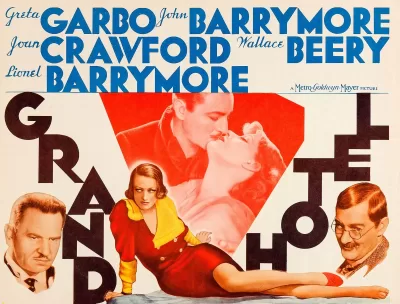Grand Hotel received the 1932 Academy Award for Best Picture. It was also voted as the best directed, best written and best acted picture of the year by the HR poll of national film critics, and was voted best picture by both the HR and FD poll..
Dr. Otternschlag, a resident at the Grand Hotel, Berlin’s most expensive hotel, observes that life at the hotel is “always the same. People come–people go, nothing ever happens.” Guests check in, share parts of their lives with one another and then leave. One such guest is Grusinskaya, a beautiful Russian ballet dancer who knows that her popularity is waning and complains that everything in her life has become “threadbare.” Grusinskaya’s stay at the hotel becomes greatly affected by her acquaintance with Baron Felix Benvenuto Frihern Von Gaigern, a charming hotel thief who plans to steal her pearls. Another guest, ailing bookkeeper Otto Kringelein, has been told that he has only a short time to live and is intent on spending his last days in the grandest style possible. Kringelein’s intentions, however, are thwarted by the presence of his inimical boss, textile magnate General Director Preysing, who is in Berlin to make an important business deal. When the baron meets Flaemmchen, Preysing’s stenographer, they flirt and make make plans to attend the hotel dance together. The baron then goes to his room, where he waits for Grusinskaya to depart for the theater. The baron enters Grusinskaya’s room through her balcony and quickly finds the pearls, but is forced to hide when he hears someone at the door. Grusinskaya, who has returned from the theater after refusing to perform, calls Pimenov, the ballet master, and learns that her presence was missed by no one. Left alone, the depressed Grusinskaya is about to kill herself when the baron emerges and tells her that he is a great admirer of her talent and professes his love for her. After they make plans to leave for Vienna and start their lives over, they spend the night making love. The following day, Preysing negotiates a dishonest business deal and goes to the hotel’s Yellow Room for a drink. There, he tries to steal Flaemmchen away from her conversation with the lonely Kringelein, which results in a bitter argument between Kringelein and Preysing. Later, when Flaemmchen realizes that she has been spurned by the baron, she accepts Preysing’s offer to travel with him. The baron, meanwhile, tries to quit the hotel robbery racket, but is forced to continue stealing in order to pay his debt. Kringelein offers the baron money, but he refuses it and instead organizes a card game with Kringelein and some other men in the hope that he can win enough money to settle his debt. The baron soon loses all of his money, while the drunken Kringelein wins easily. When Kringelein collapses from over-excitement, the baron steals his wallet, but then returns it when he sees how upset it has made the bookkeeper. Later that night, while Grusinskaya places a call to the baron in his room, Preysing catches him trying to steal his wallet and kills him with a telephone receiver. Horrified at the sight of the murdered baron, Flaemmchen runs to Kringelein for help, and he, despite Preysing’s pleadings, calls the police and turns Preysing in. The baron’s body is removed the next morning and Preysing is arrested. After Flaemmchen accepts Kringelein’s invitation to travel and live with him, they depart for Paris, certain that they will find another Grand Hotel there. Meanwhile, Grusinskaya’s maid shields the departing dancer from the news of the baron’s death and assures her that he will meet her at the train station. Grusinskaya, ignorant of the truth and certain of her happy future with the baron, is whisked through the lobby of the hotel to her car.More on Wikipedia
Watch Grand Hotel (1932)






